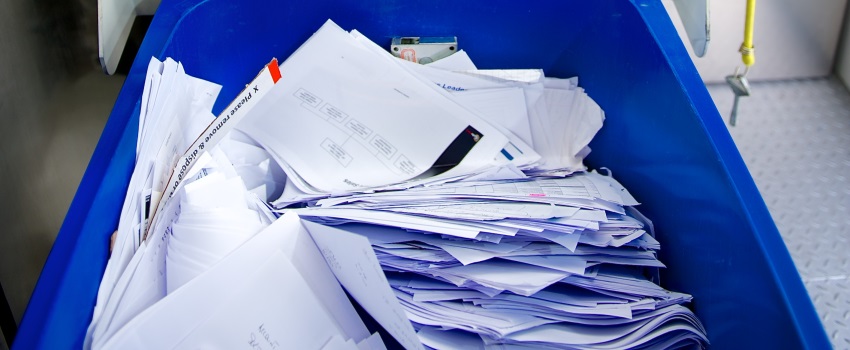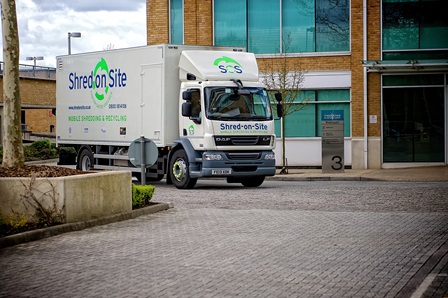Boost Your Confidence in Security and Privacy with Effective File Shredding
Whether online or offline, safeguarding personal and business information is crucial to you, your employees and your business. While digital security often takes centre stage, the physical disposal of documents remains critical to data protection. The significance of effective file shredding can bolster your confidence in maintaining security and privacy in your business.
The Risks of Inadequate Document Destruction
The consequences of improperly disposing sensitive documents are vast and varied. Identity theft, corporate espionage, and breaches of confidentiality are just the tip of the iceberg. There are still a significant number of fraud cases originating from information obtained through improperly discarded documents. Additionally, businesses face stringent legal repercussions for failing to protect confidential data, underlining the necessity of secure document destruction.
What is File Shredding?
File shredding destroys documents to ensure that the information they contain becomes irretrievable. This practice transcends mere disposal, employing specialised techniques to physically or electronically obliterate documents. Physical shredding involves cutting papers into tiny, unreadable pieces, while electronic shredding ensures digital files are permanently erased.
Benefits of Effective File Shredding
Implementing a robust file-shredding strategy offers myriad benefits, crucial for both individuals and businesses in the modern information age:
- Eliminating Fraud and Identity Theft Risks
Effective file shredding completely eradicates the possibility of sensitive information falling into the wrong hands. Ensuring documents and digital media are shredded beyond recognition effectively nullifies the risk of fraud and identity theft. This is essential in an era where personal data can be misused for financial gain or malicious purposes. - Compliance with Data Protection Regulations
Proper document shredding is key to complying with regulations like the General Data Protection Regulation (GDPR). GDPR mandates strict management and disposal of personal data. Non-compliance can lead to severe penalties, with fines up to 4% of annual global turnover or £17.5 million, whichever is higher. Confidential information includes something as simple as names, addresses, email addresses, phone numbers, national insurance numbers, IP addresses, and banking details. - Irreversible Document Destruction
The shredding process reduces documents to such tiny fragments that reassembling them is impossible. This level of destruction provides reassurance that once shredded, the documents cannot be reconstructed, ensuring the information is permanently destroyed. - Versatility in Shredding Different Media
File shredding isn’t limited to paper documents alone. Modern shredding services extend their capabilities to various media, ensuring comprehensive data security. This includes destroying hard drives, CDs and DVDs, USB sticks, SIM cards, microfiche, floppy disks, x-rays, and even video and cassette tapes. Such versatility is vital in an era where data is stored across various media forms.
Best Practices in File Shredding
Implementing file shredding best practices is crucial for maintaining data security and ensuring compliance with legal and regulatory requirements. Here are key guidelines to follow:
- Regular Shredding Schedule
Establishing a regular shredding schedule is important to prevent the accumulation of sensitive documents. Shredding could be weekly, bi-weekly, or monthly, depending on the volume of documents generated. Consistency is key to avoiding the build-up of potentially risky materials. - Educate and Train Staff
All employees should be trained on the importance of document security and the company’s shredding policies. They should know which documents must be shredded, the procedures for secure document handling, and the consequences of non-compliance. Regular training updates can help reinforce these practices. - Use Professional Shredding Services
For optimal security, consider using professional shredding services. These services often provide a higher level of security and can handle large volumes of documents and various media types. They also usually offer certificates of destruction as proof of compliance with data protection laws. - Secure Storage Before Shredding
Until documents are shredded, they should be stored securely. Locked bins or secure storage areas can prevent unauthorised access to sensitive information. - Consider On-site Shredding for Highly Sensitive Documents
Many shredding services offer on-site options for highly sensitive information, bringing added security directly to your premises. This method ensures immediate destruction of documents, eliminating risks associated with transportation. On-site shredding is ideal for handling confidential business records, legal documents, and financial information. It offers a secure and convenient solution, providing peace of mind and safeguarding against information leakage.
Effective file shredding is a pivotal component in the tapestry of data protection. Individuals and businesses can significantly enhance their security and privacy measures by understanding its importance and implementing best practices. If you want to elevate your document destruction strategies, our expert file shredding services are here to help. Contact us today to ensure your confidential information remains just that - confidential.







